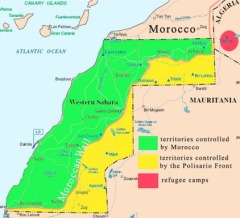
For thousands of years, my ancestors referred to an arid strip of desert land as our home. Our language bespoke the pain and joy of our national history. We practiced the religion of our ancestors, and we organized our society according to that noble tradition. That is, until the Europeans came.
They took our land. They competed among themselves over that which was never theirs, and we were forced to look on as they drew lines where none had ever existed, sowed seeds of hate where there had once been brotherhood and unity. They separated us from our livelihoods, from the lands that had provided for our families for centuries. Our lines of trade were interrupted by the arbitrary fissures they scraped into the surface of our world.
Finally, in the middle of the twentieth century, after decades of colonization, the winds of change persuaded the Europeans to slowly abandon their imperialist projects. They feigned negotiations with us, monopolizing our attention with empty promises while our neighbors secretly divvied up our land among themselves.The colonizers left, but they could not take with them the alien power structures they had so callously introduced. They left behind the foundations of an intractable political conflict.
As the Europeans gradually made their exit, our neighbors lay in wait, anxious to capitalize on the power vacuum for their own gain. Our initial colonizers left, and their successors swept in, rewriting history and constructing facts on the ground to support those revisions. According to these new colonizers, the land was always theirs, and we were never a people. They pushed us out, expelling thousands of families from our ancestral homes, forcing us to settle in refugee camps in the adjacent countries. We have been stuck there ever since, awaiting the day when justice will be served and we will be afforded the right to return to the land of our heritage.
In the decades that ensued, we saw no other option than to organize a movement to secure our freedom and the liberation of our shrunken and pillaged land from these colonial intruders. In the beginning, this endeavor was a bloody one. But bloodshed yielded grave losses and few rewards, so we relinquished violence, and our organization has since been recognized by the United Nations as the sole representative of our people. The battle for our rights, our land, and our self-determination continues to rage, and it remains, for the most part, non-violent. These efforts have secured for us relative control over a fraction of our historic homeland, but we are cut off from the rest of our land by a well-guarded wall constructed by our colonial overlords.
Our cause has received the nominal approval of the international community and the United Nations, but these symbolic victories fail to change the reality on the ground. We have engaged in peace talks orchestrated by well-meaning foreigners who offer hand-shakes and smiles, but these have proven futile. We have staged peaceful civil protests, demanding human rights while under occupation, but these are always dispersed by colonial forces before they can gain traction. Peace efforts have failed. Our protests fall on deaf ears, the world remains silent, and the occupation continues unhindered.

Political map of Western Sahara
Do you know who I am?
I am a
Sahrawi. The land to which I refer is what is known today as the
non-self-governing territory of
Western Sahara. My country was colonized by the Spanish and the French between 1884 and 1975, divided in two and occupied by Moroccan and Mauritanian forces thereafter, and has been ruled exclusively by the Kingdom of Morocco from 1979 until the present.
In the 1980s, the Kingdom of Morocco constructed a barrier of sand and stone across my country, separating the barren eastern third of the land from the more populated and developed western portion. Moroccan populations see the latter as their own, and they continue to relocate themselves there to this day, ignoring Sahrawi history and right to the land.
The liberation movement that fights for my freedom is known as the
Polisario Front, which has maintained a cease-fire with Morocco in exchange for relative autonomy over the eastern portion of the country since 1991. This partially liberated fraction of our land has become known as the Free Zone, and it is governed by the exiled
Sahrawi Arab Democratic Republic.
Despite the United Nations endorsement of Sahrawi self-determination, the 1991
Settlement Plan, the 1997
Houston Agreement, and two subsequent proposals designed by former US Secretary of State James Baker, no progress has been made to restore the human dignity of 165,000
Sahrawi refugees in camps in the
Tindouf Province of Algeria and in Mauritania since 1975, where there is little to no access to clean water, electricity, firewood, vegetables, nutritious food, or medicine. Malnutrition, iron deficiency, and other health issues are rampant. These refugees depend on foreign aid, but our plight does not attract nearly enough donations to sustain healthy life in the camps. The UN High Commissioner for Refugees has declared this refugee situation to be “
among the most protracted ones worldwide.”
As the people of the free world remain glued to their television sets and computer screens, their eyes fit with blinders that point only to the latest trending humanitarian crises as they are described by politicians and celebrities, the situation of the Sahrawi people and Occupied Western Sahara grows steadily worse as it remains the same.








0 comments:
Post a Comment